#poor velázquez
Text
A new Delicious Friend!

Good day, all, from Silvia Salcedo, the Revolution's Sappho! It is my chagrin pleasure to introduce you to my insufferable rake of a cousin, the cad and layabout charming Renaissance-man: Mr Winslow Velázquez! He is new to the Neath and has already made quite an impression in the eyes of the law, at least.
Winslow has asked me to alert my acquaintance that he is receiving visitors, and to encourage you to send him a calling-card. He is an ally of the Rubberies and has assured me that, one day soon, he shall finish his avant-garde opera, after he finishes this crate of wine.
(Art and character by my twin brother!!)
#here he is y'all!!!#poor silvia is not only plagued by an aunt but now a cousin as well#anyway my brother is a lot of fun and also likes writing letters in character#winslow velázquez#silvia salcedo#fallen london
41 notes
·
View notes
Text








Ferdinand Hodler (1853 – 1918) was a Swiss painter who developed a style he called "parallelism" that emphasized the symmetry and rhythm he believed formed the basis of human society.
By the time Hodler was eight years old, he had lost his father and two younger brothers to tuberculosis.
The family's finances were poor, and the nine-year-old Hodler was put to work assisting his stepfather in painting signs and other commercial projects. After the death of his mother from tuberculosis in 1867, Hodler was sent to Thun to apprentice with a local painter, Ferdinand Sommer.From Sommer, Hodler learned the craft of painting conventional Alpine landscapes, typically copied from prints, which he sold in shops and to tourists.
In 1871, at the age of 18, Hodler travelled on foot to Geneva to start his career as a painter. He attended science lectures at the Collège de Genève, and in the museum there he copied paintings by Alexandre Calame. In 1873 he became a student of Barthélemy Menn, and investigated Dürer’s writings on proportions.
He made a trip to Basel in 1875, where he studied the paintings of Hans Holbein—especially Dead Christ in the Tomb, which influenced Hodler's many treatments of the theme of death. He travelled to Madrid in 1878, where he stayed for several months and studied the works of masters such as Titian, Poussin, and Velázquez in the Museo del Prado.
In the last decade of the nineteenth century his work evolved to combine influences from several genres including symbolism and art nouveau. In 1890 he completed Night, a work that marked Hodler's turn toward symbolist imagery. It depicts several recumbent figures, all of them relaxed in sleep except for an agitated man who is menaced by a figure shrouded in black, which Hodler intended as a symbol of death. When Hodler submitted the painting to the Beaux-Arts exhibition in Geneva in February 1891, the entwined nude figures created a scandal; the mayor deemed the work obscene, and it was withdrawn from the show.[6] A few months later, Hodler exhibited Night in Paris at the Salon, where it attracted favorable attention and was championed by Puvis de Chavannes and Rodin.
12 notes
·
View notes
Text
The THIEF's song (La Cançó del Lladre)
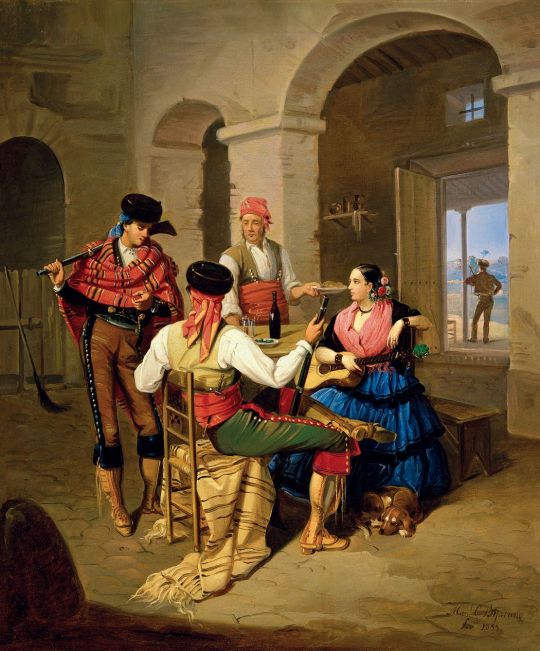
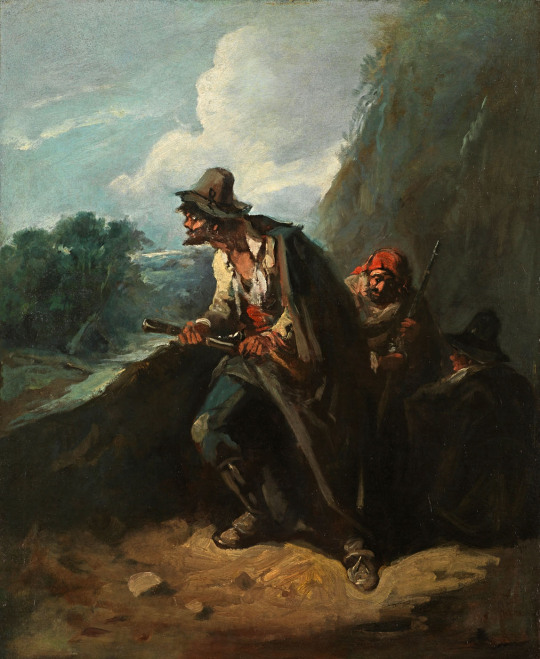
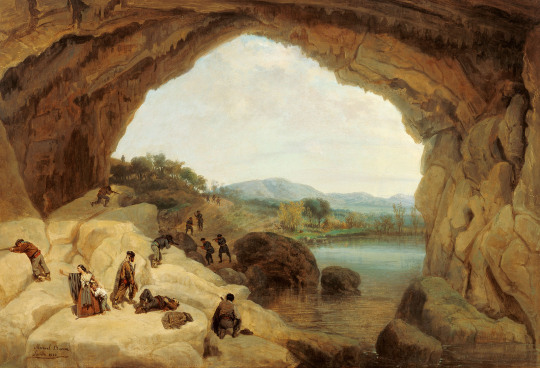
Manuel Cabral y Aguado Bejarano. Escena de una venta. 1855. | Eugenio Lucas Velázquez. Bandoleros. circa 1860. | Manuel Barrón y Carrillo. Emboscada a unos bandoleros en la cueva del Gato. 1869. [x]
"La Cançó del Lladre is a popular 18th century Catalan melody, from a tradition known as Canciones de Bandoleros: bandit songs. The bandoleros at that time were people who challenged the established social, political, and economic order, engaging in banditry in an era when divisions between social classes were very pronounced. They stole from the upper classes sometimes to give to the poor, and sometimes simply to protest against the system, which precluded social mobility and did not allow people to escape poverty and labour exploitation.
This song's lyrics are told in the first person by a thief who is sentenced to death after a lifetime of robbery and crime. Through each stanza he recounts his misdeeds, every robbery he committed, and despite everything, this song is in a major key. And in a way it is joyful. With the lyrics starting from the thief's childhood, it broadcasts that despite all he went through, he lived his life fully and he was happy. The chorus, which says "Adéu, clavell morenet, Adéu, estrella del dia", meaning "Goodbye, dark-coloured carnation, goodbye, star of the day", is a kind of farewell to life, and to that energy that made him feel alive."
— Paola Hermosín
youtube
The Thief's Song
(translation from lyricstranslate.com)
When I was a little boy
I was boastful and presumptuous;
White espadrilles on my feet
And a handkerchief in my pocket.
Goodbye, golden carnation!
Goodbye, day star!
And now that I am all grown up,
I have chosen an evil path!
I have started to rob people:
(This is) my daily job.
Goodbye, golden carnation!
Goodbye, day star!
I robbed a merchant
Who was returning from the town fair;
I stole all of his money
And the sample he was carrying.
Goodbye, golden carnation!
Goodbye, day star!
Once I had enough money
I have kidnapped a young maiden:
I have taken her with lies,
Promising that I'd marry her!
Goodbye, golden carnation!
Goodbye, day star!
The law has imprisoned me
And it has dragged me to a dark jail.
The law has imprisoned me
And it shall make me pay with my life!
Goodbye, golden carnation!
Goodbye, day star!
Original Catalan lyrics after the cut:
La Cançó del Lladre
Quan jo n'era petitet
festejava i presumia,
espardenya blanca al peu
i mocador a la falsia.
Adéu, clavell morenet!
Adéu, estrella del dia!
I ara, que ne sóc grandet,
m'he posat a mala vida!
En sóc posat, a robar:
ofici de cada dia.
Adéu, clavell morenet!
Adéu, estrella del dia!
Vaig trobar un traginer
qui venia de la fira:
li prenguí tots els diners
i la mostra que duïa.
Adéu, clavell morenet!
Adéu, estrella del dia!
Quan he tingut prou diners,
n'hi he robat també una nina:
l'he robada amb falsedat,
dient que m'hi casaria!
Adéu, clavell morenet!
Adéu, estrella del dia!
La justícia m'ha pres
i a presó fosca em duïa.
La justícia m'ha pres
i em farà pagar amb la vida!
Adéu, clavell morenet!
Adéu, estrella del dia!
#La Cançó del Lladre#La Canción del Ladrón#Paola Hermosín#The Thief's song#prison ballads#folk#catalonia#spain#bandit#bandolero#theory#swinging from the gallows tree#art#the Rogue school of translation gives exactly zero fucks#(not the song just the intro)
23 notes
·
View notes
Text
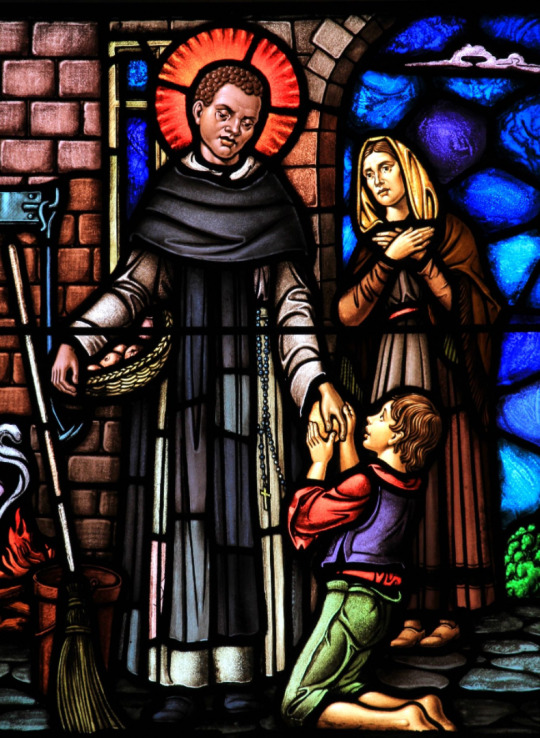
THE DESCRIPTION OF SAINT MARTIN DE PORRES
The Patron of Barbers (and Hairstylists), Race Relations and Social Justice
Feast Day: November 3
"Do not complain, that shows discontent with the will of God in the present moment. That is also proof of impatience."
Martin de Porres was born in Lima, Peru, on December 9, 1579 to Don Juan de Porras y de la Peña, a Spanish nobleman and adventurer, and Ana Velázquez, a freed daughter of slaves from Panama. His father abandoned the family when Martin and his sister, Juana, were very young. Ana Velázquez supported her children by taking in laundry.
Martin's childhood poverty did not embitter him but made him sensitive to the plight of the poor, and especially the orphans to whom he would devote much of his time and resources. Even as a child, Martin would give the family's scarce resources to the beggars whom he saw as less fortunate than himself.
When Martin turned eight, his father had a change of heart and decided to claim his two children (publicly identified as mulatto, a term used for mixed-race children) in spite of the gossip to which it subjected him. He made sure that both were afforded a good education and had enough money for the family not to suffer hardship. At the age of twelve, Martin began an apprenticeship with a barber/surgeon named Marcel de Rivero. He proved extremely skilful at this trade and soon customers, who at first were sceptical of the young coloured boy, came to prefer and ask for him.
After leaving home, Martin took a room in the house of Ventura de Luna. Always a devoted Catholic who spent much time in church, Martin begged his landlady for some candle stubs. She was curious about his activities and one night spied on him through a keyhole and witnessed Martin in a vigil of ecstatic prayer — a practice he would continue throughout his life.
Martin often challenged his brothers on their racial attitudes. In one story, Martin came upon a group of Indians sweeping the floor under the watchful eye of one of the Dominican brothers. When told that they were cleaning to repay a meal they had received, Martin pointed out that the brother had fed some white people the previous day without forcing them to clean. After Martin's firm but gentle challenge, the brother took up the broom himself.
Martin frequently insisted on performing such hard and menial tasks as caring for the Order's horses in the evenings, even when informed that servants were available for these chores. He would argue that the servants were tired from their day's work while he, Martin, had done very little. He also extended his healing gifts — going to the servants' quarters and treating their ailments.
Martin's spiritual practices were legendary. He would often fast for extensive periods of time on bread and water. He loved all-night vigils, frequently praying by lying down as if crucified, sometimes kneeling but, miraculously, a foot or more off the floor. Equally legendary was his love of animals. He would feed and heal all animals that came into his vicinity and they understood and obeyed him.
Martin is often portrayed with mice because, according to one story, the monastery was tired of their rodent problems and decided to set traps. Martin was so distressed that he spoke to the mice and cut a deal with them that if they would leave the monastery, he would feed them at the back door of the kitchen. From that day forward, no mouse was seen in the monastery.
However, it is Martin's charity that made him the patron saint of social justice. Martin fed, sheltered and doctored hundreds of families. He also provided the requisite dowry of 4,000 pesos to enable at least 27 poor young women to marry. Last, but not least, he established the Orphanage and School of the Holy Cross, which took in boys and girls of all classes and taught them trades or homemaking skills. Over much criticism, he insisted that the school staff be well-paid so that they would give their best service.
Martin died on November 3rd, 1639 at the age of 59 in Lima. He died surrounded by his brothers and reciting the Credo, his life ending with the words 'et homo factus est (He had became man)'.
His funeral was attended by thousands of Peruvians from all walks of life who vied to get a piece of Martin's habit as a relic. These pieces of the saint's habit have been associated with innumerable miraculous cures. Martin de Porres is buried in the Convento Santo Domingo in Lima, Peru.
#random stuff#catholic#catholic saints#dominicans#order of preachers#barbers#hairstylists#race relations#social justice#lottery winners#martin de porres#martín de porres velázquez
9 notes
·
View notes
Note
I was so hyper fixated on gabriel ultrakill mpreg real that I forgot to actually type it out in the reblog. Put a sperm bank in the war machine. If people can porn their way into saying V1's creators put a dick just because they could, why not with full plumping too. You just need to keep shit cold enough. The shit a breeding kink does to a mf its surprisingly common from what I've seen in the ultrakill's NSFW fandom
The dick idea is nice, imagine that they did that to inflate V1's price, like "hey, is good as a weapon, unstoppable btw and ALSO sexually serviceable in or out the battlefield" Maybe many machines were designed like that because let's be real, that's where robots are going to, there are many robots already created for pleasure irl. Like taking a vibrator to the next level.
V1 with the ability to deposit sperm within its body and preserve it is fun also. Imagine they can do that as a secondary perk let's say of fucking it. The thing doesn't only satisfy you but keeps semen viable inside itself, just in case something happens and people need to reproduce. (If machines are that advanced i guess some people would prefer metallic partners instead of another human. Why? Because you can program them to love you i guess ... and they can do stuff other people wouldn't in bed.) It's perverse, it can be sad also! V1 designed to have secondary functions that aren't combat related could like explain why it took them so long to finish the prototype.
So, V1 can do that which means someone has to fill it right? If it was inactive during humanity extinction, who the fuck r*ped the poor thing hellllllll nnnaaahh. V1 be like "omgggg i actually have frozen cummies in me!!! Who the fuck is Santiago Velázquez 😭😭😭😭😭😭" realizing Santiaguito, many years ago, felt like boning a sleeping GoPro. And Gabriel would have to choose between using that person's sperm to get pregnant, or make V1 get rid of it after what that person did to his beloved.
Wrydhkdjj i digress.
Sick fic idea. It'd be one of those horny fics that end up having a heavy, dark plot that get you invested and crying. And maybe question your morals. If a machine has the ability to consent but it's also programmed to serve, does it always really want to be intimate with you? Or is it only following the robot rules? ooommm Asimov, fuck you
11 notes
·
View notes
Photo










#El Ministerio del tiempo#tiempo de ilustrados#mdt#emdt#Diego Velázquez#julián villagrán#Francisco de Goya#pedro casablanc#spanish art#poor velázquez#his meeting with goya was not what he expected
303 notes
·
View notes
Text
𝐏𝐑𝐎𝐅𝐈𝐋𝐄


𝐍𝐀𝐌𝐄
↳ Mystic Tsukinami (Maternal Surname: Jomei)
Mystic — One of a kind. His name derives from his mother’s hazy words right after his birth after hearing one of the servants refer to the baby by the loving nickname of “mystic child”.
Tsukinami — (tsuki) “Moon” (nami) “wandering, waves, billows”
Jomei — “Spread light”
Katakana Name — 「 ミスティック 」 ( Misutikku )
Kanji Surname(s) — 「 月浪 (助命) 」
𝐀𝐋𝐈𝐀𝐒
↳ Mys | Aiden | Lowell
𝐕𝐎𝐈𝐂𝐄 𝐂𝐋𝐀𝐈𝐌𝐒
Speaking Voice
↳ English VA — (N/A)
↳ Spanish VA — Jerry Velázquez (as Aladdin in Aladdin: Live Action)
↳ Japanese VA — Yuma Uchida (as Ash Lynx in Banana Fish)
Singing Voice
↳ English VA — Alexander Stewart
↳ Spanish VA — Jerry Velázquez
↳ Japanese VA — Chogakusei
𝐁𝐈𝐑𝐓𝐇𝐃𝐀𝐘
↳ September 19
Sign — Virgo
𝐒𝐏𝐄𝐂𝐈𝐄𝐒
↳ Demon
𝐑𝐀𝐂𝐄
↳ First Blood-Ruby Eye
𝐄𝐓𝐇𝐍𝐈𝐂𝐈𝐓𝐘
↳ British — Mystic’s maternal side of the family comes from a poor lineage settled on the capital of Great Britain.
𝐁𝐋𝐎𝐎𝐃 𝐓𝐘𝐏𝐄
↳ O — Individuals in this group are known for being confident and determined, as well as outgoing and loyal.
𝐁𝐈𝐑𝐓𝐇 𝐀𝐒𝐒𝐈𝐆𝐍𝐄𝐃 𝐒𝐄𝐗
↳ Male
𝐆𝐄𝐍𝐃𝐄𝐑
↳ Male
𝐏𝐑𝐎𝐍𝐎𝐔𝐍𝐒
↳ He | Him
𝐒𝐄𝐗𝐔𝐀𝐋𝐈𝐓𝐘
↳ Bisexual (with a heavier attraction towards the male gender)
𝐎𝐂𝐂𝐔𝐏𝐀𝐓𝐈𝐎𝐍
↳ Bounty Hunter — Debt collector under Kazuha’s orders. Often works on jobs from leaders of other clans, but also takes human clients that happen to find his services. He is only sent out to collect the sum of money owed, but is authorized to finish off the target if the quantity is not handed over.
↳ Prince of the Owl Clan (Monarch apprentice) — As the son of the Jomei’s queen, Mystic is in charge of managing conflicts targeting the Underground Kingdom, as well as delegating decisions proposed by the officials alongside his mother.
↳ Prince of the First Bloods — As grand as this position may appear, Mystic isn’t necessarily involved in the Tsukinami’s affairs. As he is Shin’s son, he isn’t high up within the lineage to be considered for the throne. Therefore, he will not be explicitly asked to contribute into major decisions.
↳ Third-Year Student — Attends Ryuotei Academy on-and-off. He tends to be very busy outside of his studies, but he will appear in class from time to time. His grades are good and is well-liked by classmates and teachers, but does have a difficult time getting used to a public setting because he has been homeschooled throughout his entire life.

𝐀𝐆𝐄
↳ Physically — 18
𝐖𝐄𝐈𝐆𝐇𝐓
↳ 60 KG
↳ 132 LBS
𝐇𝐄𝐈𝐆𝐇𝐓
↳ 5-feet, 7-inches
↳ 170 Centimeters
𝐀𝐏𝐏𝐄𝐀𝐑𝐀𝐍𝐂𝐄
Mystic is the smallest of the males in his family, standing slightly below average height, and has noticeably narrow traits from his shoulders to his lower torso. He is rather pale but has a much vivid tone, giving him more of a humane appearance unlike most other characters. His eyes’ shape changes depending on his mood, but they are naturally round and brilliant. His irises are mismatched: the right is a vivid red and the left a bright golden. He has messy obsidian hair; the kind that cannot be combed down by any means possible, but doesn’t give him a crazed appearance. In fact, it gives volume to his face.
If you ever catch a glimpse of Mystic in public, it is very likely you’ll see him in his bounty hunter uniform. Composed of a black, thin, turtleneck undershirt and crop top-stylized jacket that carries multiple inner and outer pockets. The bottom half of his uniform consists of dark cargo trousers, also equipped with multiple pockets and casings, and works on either flat sneakers or military-like boots.
His casual attire consists of a loose-fitting gray sweatshirt and an extra, larger denim jacket with wide black sleeves. He wears black jeans and some ankle-high, worn-down Converse brand sneakers.


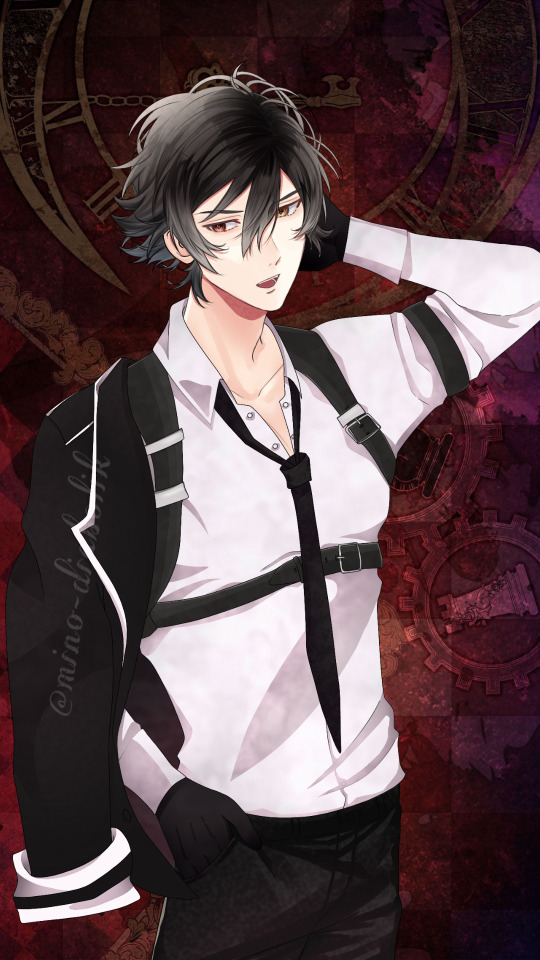
Casual — Bounty hunter uniform — School uniform
[Sprite made by lavendel081 (Tumblr) / lavendel080 (Instagram)]


Casual — Bounty hunter uniform
[Made by equinox-86 (Tumblr) / (Instagram)]
𝐏𝐄𝐑𝐒𝐎𝐍𝐀𝐋𝐈𝐓𝐘
Mystic is widely known as an amiable and outgoing young man with the widest of smiles you’ll ever come across. He is very carefree and tends to trust people that treat him nicely—as long as he hasn’t had any negative interaction with them in the past—which can lead to him being tricked pretty often. He is quite gullible, one could say.
In spite of that, he is very sharp- and quick-witted guy. He is quite the genius when he wants, crafting plans and traps for his targets on an almost daily basis. He likes deceiving them or his prey, chasing them or having them chase him around. The thrill of chasing and being chased is something he tends to enjoy.
When drove to his end-wits, he becomes much more foul-mouthed than he usually is and tends to opt for violence because he is way too hotheaded to handle a verbal exchange. Still, he bickers a lot and likes to get under the other person’s skin.
𝐌𝐁𝐓𝐈 𝐏𝐄𝐑𝐒𝐎𝐍𝐀𝐋𝐈𝐓𝐘 𝐓𝐘𝐏𝐄
ESTP-T
An Entrepreneur (ESTP) is someone with the Extraverted, Observant, Thinking, and Prospecting personality traits. They tend to be energetic and action-oriented, deftly navigating whatever is in front of them. They love uncovering life's opportunities, whether socializing with others or in more personal pursuits. (X)
𝐀𝐁𝐈𝐋𝐈𝐓𝐈𝐄𝐒
↳ Supernatural Strength — As a hybrid of nearly equally powerful creatures, it isn’t surprising for him to possess abilities that go beyond a humane capability.
↳ Keen Eyesight — Capable of catching a speedy blur through his peripheral vision and spot a creature from exaggerated heights and distances.
↳ Acute Sense of Smell — Capable of picking up faint aromas that humans could not, as well as identifying an individual’s species/race from their scents.
↳ Sensitiveness — Mystic’s body reacts to a creature’s aura/presence in the form of a shudder or goosebumps as soon as they are within a certain distance from him. (Extra information)
↳ Aromatic Blood — The speck of human genetics in Mystic’s blood strengthens its scent, which he often uses to draw out targets or creatures he is after.
↳ Shapeshifting — As a First Blood, he is capable of shifting between the four shapes of all clans: Bat, snake, eagle, and wolf. Plus, as part of the Jomei lineage, he is capable of transforming into an owl as well.


𝐅𝐀𝐌𝐈𝐋𝐘
Tsukinami + Jomei
◈ DJ/Desdemona Jomei (Mother)
◈ Shin Tsukinami (Father)
◈ Caleb Jomei (Stepfather)
◈ Carla Tsukinami (Uncle)
◈ Kazuha Tsukinami (Cousin)
𝐑𝐄𝐋𝐀𝐓𝐈𝐎𝐍𝐒𝐇𝐈𝐏𝐒
Direct Family
❖ Desdemona Jomei
Mystic’s relationship with his mother is beyond amazing. She had him despite all dangers and the disapproval of so many people, so she grew to be overprotective of him. She cared and spoiled him since a young age, even when the time she could afford to spend with him was minimal. He loves and admires his mother.
❖ Kazuha Tsukinami
His boss is to be feared, but Mystic would be lying if he were to say he didn’t enjoy her company. He admires her ability to remained poised and calm throughout any situation. That doesn’t mean he will not cower under his bed if he has managed to trigger the wrath of ten thousand gods out of her. They get along decently well, despite their multiple and repetitive petty arguments. Either of them would not hesitate to jump in front of the other to protect them from danger.
❖ Shin Tsukinami
Mystic doesn’t have much of a relationship with his biological father. He doesn’t exactly consider him his father and feels odd calling him by anything other than his name—though it makes him very happy when he does. It’s painfully obvious that Shin struggles with the concept of being a father, but Mystic just rolls along with it for Shin’s sake. More than father-and-son, they share a competitive friendship in terms of strengths abilities, and for DJ’s attention.
❖ Carla Tsukinami
Mystic fears his uncle beyond a normal scope. Carla has never done anything overly terrible to him, but the mere presence his aura brings into the room horrifies the poor demon like no other creature has ever been capable of doing so. Even so, he does look up at his uncle with exceeding respect and as a type of being he will never be able to match.
Jomei Family
❖ Marko Jomei
Mystic didn’t have a good relationship with his grandfather. Marko profusely refused to accept him as part of the family for being the offspring of someone from the First Bloods. He was abusive towards the child and fractured his already broken relationship with DJ.
❖ Caleb Jomei
(Acquired the surname of Jomei after being betrothed to DJ.) Caleb raised Mystic as though he was his real son even when he was simple the prince consort (queen’s husband) and had no romantic attachments to his mother. He loved taking the role of father very much. They don’t have much in common—with Mystic being an outgoing troublemaker and Taro a meek, reserved man—but they get along perfectly well.
Sakamaki Family (Will only be adding characters Mystic has a story with, because there are just too many to write—)
❖ Kino
Speaking in terms of the primary universe, Kino and Mystic are in a committed relationship (and later married). They met by mere chance, where things escalated from there. Mystic came to enjoy the company of the Vampire, and viceversa from Kino’s perspective. The rivalry-friendship grew out of proportion as they slowly grew closer through a great chunk of their close encounters.
❖ KarlHeinz
Mystic met the ominous Vampire King once in his childhood. He was very young at the time and can’t recall the reason to why or how he ended up standing in front of him. The memory of the man’s aura and complexion remains incredibly vivid in his mind.
Mukami Family
❖ Ruki Mukami
Mystic has had a not-so-subtle crush on Ruki ever since they met. This can be observed in his sudden change of demeanor (becomes meek and easily embarrassed) every time he crosses path with the Vampire.
In the universe shared with @ruki--mukami, Mystic had quite a bloody encounter with Ruki after he accidentally wandered into the Mukami Residence and made a mess in a brawl with a hell-born creature he’d been chasing. It isn’t exactly a secret that Mystic is quite intimidated by the Vampire. Even so, he often acts indifferent and unbothered by Ruki’s presence. As of now, their relationship evolved from that of master-and-prey that happen to share similar hobbies and likes, into more of mutual romantic feelings, as much as Mystic tries to deny it.
❖ Yuma Mukami
They are an absolute wreck. Both are hotheads and often start bantering and brawling. There is never a time that they see each and don’t immediately go at each other’s throats. Aside form that, they get along pretty well. They have more of rivalry-friendship.
❖ Kou Mukami
Mystic likes Kou’s outgoing personality, but feels uncomfortable around him. There is something that just doesn’t feel right, as though the person he is looking at the real person, but a mask.
❖ Azusa Mukami
Azusa once figured out Mystic reacted to wounds. He explained in a panic about his sensitiveness and begged Azusa not to tell anyone about it. He agreed to it, but continuously asked Mystic to talk about it more. Mystic prefers not to, though he will from time to time.
Others
❖ The Owl Twins
↳ Eirwen, Valentina
Arranged in order of age. Aside from being the trusted advisers of the royal family, the twins were assigned as Mystic’s caretakers soon after his birth after DJ was forced away from her son to take care of her responsibilities in the kingdom. They were basically the people that made sure Mystic wouldn’t end up getting himself into trouble or hurting himself, which was quite the difficult task.
❖ Yui Komori
As a fanged creature in the Diabolik Lovers universe, it is fair to say that falling—even ever so slightly—for Yui was going to happen sooner or later. Mystic finds her incredibly adorable and sometimes even envies her innocence. He openly flirts with her, but thinks of her more as someone to find amusement with. Since was brought up by a half-mortal mother instructed in a Catholic roof in her childhood, a few human values have also been passed over to him.
AU relationships
❖ Aimer Kurosawa (@kurosawa-family)
Loving husband for who he would drop whatever he wanted in a heartbeat. Their meeting wasn’t exactly the most romantic of encounters, nor was their primary arrangement as “friend with benefits”, but both unavoidably caught feeling for each other. Due to traumas of their pasts, this segment of their development could only be said to have been incredibly difficult. But they’re very much happy now!

𝐇𝐈𝐒𝐓𝐎𝐑𝐘
Childhood
Mystic was born in the Underground Kingdom when DJ was dragged out of the Banmaden by her father, right after the First Bloods lost the war and were incarcerated. He grew up aware of the fact Caleb wasn’t his biological father, but had to act as though that were the case to avoid a scandal of the heir to the throne being a half-blood. Mystic’s grandfather would often demean and physically abuse him, spiteful of the fact he was the son of a First Blood and because his daughter refused to have a child with the man he had picked out for her—hopeful to erase any trace of human blood he had brought into the family lineage. DJ would intervene in Marko’s abuse anytime she caught it or realized Mystic was bruised up from unknown circumstances. She was fiercely protective of Mystic, as he was the son of the man she loved and presumed dead at the time.
After Marko’s death, Mystic was finally allowed to go on freely within the castle and out in the kingdom’s territory, though always under the watchful gaze of his caretakers. It was around this time that he began breaking out of his sheltered and meek boy shell and finally began turning into the outgoing and grinning character of his present. He was very loved by the villagers and made them feel safe to be so close to the royal family. He certainly changed the dynamic between the peasants and the royals after the death of the former king.
Early Life
After a heartbreak, Mystic coincidentally left the kingdom for a couple of years with his mother and stepfather to visit his mother’s hometown in London. He began experiencing with substances and other harmful objects, as well as toying around with humans as a form to derive his mind from his grief. Soon enough, he became notorious for this habits—specifically since that certain lifestyle was specially frowned upon at the time—until he and his parents left town. But he started enjoying that way of life and never broke away from those habits.
Mystic started traveling out of the Underground Kingdom almost daily once her mother allowed him. He was a scandalous man, open about his likes and habits for which he caught a lot of heat by multiple groups of people in the Human Realm. Still, he also formed a lot of alliances, friends that—even in their old age in the current day—continue to be happy to see him visit every once in a while.
Current Role in the Story (Dark Fate & Lost Eden)
(Work in progress!)

𝐓𝐑𝐈𝐕𝐈𝐀
◈ When Mystic speaks in English, he has a noticeable British accent.
◈ Mystic’s vocabulary is considerably wide and embellished from his upbringing as a prince, but soon blended with his vulgar idiosyncrasy. All of which led to an odd mixture of vulgar and elaborate speech mannerisms.
◈ Mystic is ambidextrous.
◈ His hands are 7-inches long and 3.5-inches wide.
◈ His waist has a diameter of around 8-inches (or 21 centimeters).
◈ Mystic’s blood tends to be naturally sweet, but may become bitter in somber instances and sweeter when exalted/as his heart raises (for whatever reason: excitement, fear, etc.) Its effects immediately invoke energizing effects and is potentially capable of carrying recuperating abilities. It’s as strong-tasting as it is aromatic.
◈ Mystic knows how to sing and play the piano.
◈ His favorite hobby is drawing portraits in charcoal.
◈ He can speak multiple languages. Most notably: Spanish, French, and Italian.
◈ Mystic knows how to handle firearms.
◈ He knows how to drive a car and a motorcycle.
◈ He owns a 2000 Indian Chief and a 1926 Bentley.
◈ His favorite food is Bouillabaisse: A traditional French stew of shellfish and fish, sometimes served with spicy sauce.
◈ He loves junk food. (Potato chips, sweets, etc.)
◈ His tattoo is very much alive, therefore it is capable of shifting places throughout his body. It commonly sticks to his right arm, however.
76 notes
·
View notes
Text

I'm unconcentrating, so let us once more appreciate in detail one of my favourite paintings of all time, Diego Velázquez's La fragua de Vulcano (Vulcan's Forge)
As you can see, it's Apollo letting Vulcan know that his wife, Venus, is having an affair with Mars, and everyone is going through it, as follows:

So, he's fabulous, is the only one who brought his rays and divine glow with him for this very special occasion in which he ruins Vulcan's day. You can tell he's not super sorry that this is his role in the story. He might be adding some details for flavour.

This is the face of a man who sure is holding a hammer.

Listening intently. He is convinced he's being cheated on too; he is convinced everyone is being cheated on, actually, and this is confirmation. Later he will: use this as an excuse to drag everyone to the bar; offer some consolation (?) in the form of aphorisms so cryptic no one understands what he's saying; claim he saw this coming (he didn't).

The one guy who actually saw it coming, and he's sorry, really, but like. We are at work. No, i understand, it' super sad, but we were supposed to have this done Wednesday, guys, and it's like every day there's something, you know? Like last week there was the automaton with the box, and the week before it was that Prometheus guy and it just feels like we've been pushing off deadlines an awful lot

It's his first day, and what a day. I feel like the face says everything. He's so shocked, poor baby. You think an ancient Greek god would just do that? Just go off and... have an affair?

He's been late every single day since he started three years ago and he still doesn't know where anything is. He just walked into this and he's so sorry, man.
#i'm somewhere i can't really do anything so it's silly post time#but really#this painting is so cool#blah
8 notes
·
View notes
Text
Tiles on the Roof
An Encanto Fanfic
Prompts 37-48
“Outside the House”
First | Previous | Next
37. Ordenar
(v) sort through, collect, ordain (religious); masculine singular past participle ordenado
Padre Juan Flores doesn’t mind being the priest in San Ambrosio. In terms of parishes, it’s one of the more easygoing ones for the most part.
Confessional gets a bit weird, though.
“So I impersonated a priest again and I’m not one hundred percent certain that’s a sin but it might be. Papá and Abuela don’t like it, I know that. I got your hairline right this time, though.”
“I have a weird urge to slack off and I hate it. What if Señora Ozma needs me to reroute the river again?”
“Some of the most terrible gossip from around town has reached my ears. I don’t know whether to feel guilty or to warn you about what’s likely coming your way or both.”
Mind you, his own prayers have been a bit strange in recent decades. Gathering his thoughts has never been harder than it was in the first few years.
Lord, a little guidance on the teenage girl in the marketplace who is doing miracle healing? I literally saw someone get their finger reattached this afternoon. Do I need to write to someone in Rome about whether it qualifies her for sainthood?
Lord, I prayed to you for a little rain for my flowers and one of the Madrigal triplets stormed by in a huff and suddenly I was in the middle of a thunderstorm. Are you trying to tell me something or was that just an unhappy coincidence?
Lord, we’re quite clear on the non-efficacy of pagan magic, right? And of course pride is a deadly sin but is there any way you could let me know exactly how clearly pagan magic is false and thus diminish my worries about going completely bald within the next three weeks please??
At least he’s doing better than poor old Padre Antonio Juarez in Macondo. God, the guy’s a gibbering wreck in some of his letters.
38. Banda
(nf) group of musicians, band, sash
They’re new in town. They’ve been there long enough for a few things to sink in, like how “We Don’t Talk About Bruno”, but a lot of it still is new to them.
Gustavo, Carmen, and Tomas are musicians at heart and by trade. Of course they hear the song, and if it’s strange then, well, isn’t this exactly the right place for it? The young lady has a talent—she’s just being modest. Take an accordion, Señorita Madrigal, tell us what we already know! You’ve earned it!
Oddly, she still seems too shy to talk about her gift.
(She does give them the accordion back, mind you, even though she plays it well.)
39. Quejarse
(v) complain, grumble, quarrel; masculine adverbial present participle quejando
Osvaldo is more than a little frustrated by the growth of his belly. Not that he’s vain, you understand, it’s just...well, Bruno Madrigal doesn’t have the best bedside manner in the world.
“I mean, you will grow a gut, that’s, you know, that’s here in the sand, it’s just that, well, think about it like this, you’re gonna enjoy a lot of good food!”
...look, just because he does, doesn’t mean he wants to know that he’ll have to face the consequences, alright?
(The Family Velázquez have given San Ambrosio some of its best shoemakers, but they’re as bad as the Quinteros when it comes to pettiness.)
40. Niñero
(nm) babysitter
It's not exactly like Mariano thought this was a good way to get close to the Madrigals. He's a fifteen-year-old boy, sure, and has had more than a passing interest in girls for a while, but, you know, he's also a fifteen-year-old-boy and babysitting is the last thing on his mind. But Mamá wanted him to give it a try.
"All so busy, the Madrigals," she told him, trying to tidy him up. "And what with poor Mirabel having no gift and her father trying to do what he can around the village, they really do need some help. Besides, it will help smooth things over when it comes time to marry Isabela."
Mariano, youngest of his siblings and generally happier playing the lovelorn fool than upsetting his mamá, shrugged and went along with it.
Let the record state that he was not prepared for this.
Mirabel’s terribly high level of destructibility and propensity for accidents are matched only by her compete disregard for her own safety. At six years old she's already quite precocious (precoz), which Mariano's book Mil palabras que un poeta debe saber defines as "having developed certain abilities or elements more quickly than is usual for one's age" and which Mariano has privately defined as "making up for the natural magic of the Madrigals by trying to do everything at once". Honestly, as a temporary carer he's kind of wasted.
As a big brother figure to Mirabel and occasionally Camilo, though, he's not had quite this much fun in years. And it's not even about impressing The Fair Isabela anymore, he just…likes these kids.
(Mostly. Except when they play that twin trick. That's just being deliberately unfair.
"No, I'm the real Mirabel! Can't you tell?"
"Hmm, that depends. I think that your glasses are just the wrong shade of green, your hair microscopically less bouncy, and you don't walk quite right. You kind of shuffle around instead of dancing."
"No, no, I'm really me! Mister Mariano, you're not being fair."
"I wonder…what did you tell me about Luisa and the bookshelf the other day?"
"I don't remember! What did I say? Anyway, how do I know you're not Camilo pretending to be Mister Mariano? Don’t you trust me?"
"Oh, no, not the wobbly lip, you’re not allowed to be cuter than me...okay, okay, let's all take a deep breath and all twirl back into our proper forms in three…two…onnnnnnnnnnnnne—oh. Alright, I'm sorry, Mirabel. You win. It's getting harder to tell when you act so much like Camilo, you’ve gotten really good at imitating his walk."
"I have?" Shoomp. "Aw, nuts. You nearly got me."
"…I…"
"Mira, Mira, get in here, I got Mister Mariano to make the face again!"
“Yay, we win!”
This calls for an impromptu tickle fight.
“Scoundrels and tricksters! Betrayed by my two best amiguitos! What next?”)
Camilo becomes cooler and more distant as the years go by, but Mirabel he's always been friends with even though she finds his well-crafted “galán distinguido” act to be kind of dumb. She doesn’t even make fun of Mariano for wanting to be a poet—neither do Dolores and Luisa, but they’re about the only ones among his (rough) age-mates who don’t and Dolores is good at keeping secrets (including her own) while Luisa literally doesn’t have time to waste commenting. He’s pretty sure even Isabela doesn’t like his work, although she never gives him a concrete answer one way or the other. The poets talk about love as a time of great passion, but they never say anything about not having small talk.
(Maybe it’s kind of expected that you shouldn’t do it, that it diminishes the romance and then the marriage somehow. His mother and father only really discuss business together, after all, not really anything emotional. And their romance is still talked about in the village. Maybe Isabela is just practicing for that.)
41. Negativas
(adj) negative
“Dios mío, what happened to your face?” wails Rosenda, who has no indoor voice.
“Ay, hermana, I just got kicked,” protests Marta, who has no survival instinct.
“By a cow?”
“...yes?”
“In the head?”
“So I forgot to tie the legs down, so what? I do feel a little...strange, though...”
“Ayy, first my fish and now my sister! A life of eternal loneliness awaits me!”
“Let’s just get you to Señora Madrigal,” says Renata, who has no lack of patience with her older sisters. (And also no qualms about taking out her frustrations on those who cross her, but she at least is working on that.)
42. Curandero
(nm) shaman, witch doctor, quack (medicine), healer
"Taita is a more respectable term, Señora Madrigal," he says mildly. "But no matter. How might I help you?"
Alma Madrigal doesn't look too happy to see him, and neither does her son. But they're both still here, outside his hut on the very edge of the encanto. They are the keepers of the Miracle; he's just set up shop in a particularly potent locale.
His profession, if you may call it that, is to keep balance in the cosmos—or at least a specific part of it. And for that, you need to keep your eyes and ears open—inner eyes and inner ears as well.
Alma Madrigal explains. She is still new to magic, and her sixteen-year-old son has the most uncontrollable magic of all. His oldest sister has complete control over her gift, the middle sister has hers active all the time. (Which explains a lot about the weather in this valley, to be honest.) But Bruno's gift is…erratic. He gets tunnel vision, of a sort, randomly spouting nonsense that somehow comes true. Sometimes it comes true the next day. Once it took over ten years. And it…hurts him, when he uses it. If the gift is to be used properly for the encanto, says Señora Madrigal, then there has to be a way to make it better.
He ponders this.
"You realize what you are actually asking me, Señora Madrigal," he says at last. "I know of your family. I know you know what a taita—an originario—really is. Why would I take on an outsider, from a veritable palace down in the town, and teach him to become a leader just out of nowhere?"
“I am asking you to help my son,” says the woman, a little sharply.
“And I am saying that I have no reason to accept your request. I have other concerns at the moment. Your family’s miracle is...different. Not our magic. I see no reason to give your son a place as an apprentice simply because—”
"You will."
He curses. (He probably shouldn’t but seriously, what the—)
Bruno Madrigal's eyes are lit up, bright glowing green in place of warm worried brown. He looks like he's in agony, like there's too much noise. His voice, when it comes through, sounds...well, “dopplered” isn’t a very common term yet, not in the middle of the rainforest, but it sounds like his voice is coiling back in on itself. Like someone else’s voice is trying to force its way out of his lungs at the same time as Bruno’s.
"You'll tell me and Mamá to leave, and then you'll have time to think, and then we'll meet and a log will roll down the road and nearly trip us up and you'll say yes and I'll learn how to work with the sands and I'll hate it but it has to be done because it keeps getting worse and worse and when I have to leave my family forever I'll remember this moment and—"
“Enough.”
Bruno falters. His breathing becomes easier.
He shouldn’t have Spoken, shouldn’t have cut the boy off, but this...this is new.
“Señora Madrigal,” he manages, a little breathless himself. “I need time to...consider my options here.” He manages to stop himself from saying “think it over”.
She nods, wryly, supporting her collapsed son as gently as she can. “Take all the time you need, Señor Originario. You know where to find us. We live in the veritable palace down in the town.”
He watches them leave.
He is not, as a general rule, given to introspection about the nature of magic. The land works well enough on its own without people mucking about with powers they shouldn’t be dealing with.
But he has to wonder, just a little, what kind of magic did strike the Family Madrigal sixteen years ago, and how the...heck...the land literally changed around them. It could be...intriguing.
Besides...it might be an opportunity to actually bring his people back in line. San Ambrosio is a puebla colonial, yes, but they know about encantos. Giving them a taita, mestizo though he may be, would not be the worst thing in the world, surely.
(He nearly trips over the log. He doesn’t.)
43. Ansia
(nf) craving, yearning; anxiety, apprehension
Elisenda Ozma is old enough to remember San Cristóbal. She remembers the town much better than she does San Ambrosio, to tell you the truth. And maybe she wouldn’t indulge in such trivial things as asking Luisa to reroute the river if it ever proved a problem for her, but it doesn’t, and she enjoys hearing the waters pass near her house on a Sunday like it did in her old home, as she sits in her chair and reminisces.
(“She’s a cat,” sighs Julieta to Agustín. It’s become a code word of sorts for them, a shorthand for something Julieta, for all her powers, just can’t heal. “It’s not like she’s forgetting, she remembers things well, it’s just that I can’t convince her that it’s something that needs fixing.”
Agustín, who is still wincing a little from a rapidly-recovered broken leg and thus a tad distracted, does his best to focus on his wife’s expression through his glasses and rearranges his face accordingly. “You’re doing all you can, mi amor. And she’s not hurting anyone per se. I’m just a little worried that Luisa’s taking on too much for her. She keeps wanting to handle everyone’s problems on her own.”
“She doesn’t want to be a burden,” says his wife, and smiles softly. “She takes after her father that way.”
“And in no way could she ever be one. Just like her mother.”
“Get a room, you two!” calls a rather pregnant Pepa somewhat hypocritically as she walks past.
“We have one. It’s the kitchen.”
“Bleh.”
“If you’re not hungry, then by all means—”
“Is that arroz con pollo?”
“It might be.”
“Gimme.”)
44. Adicto
(nm) addict
When he's older, Juancho will shrug and grin and say, "Eh, with all the excitement going on around town, how else was I supposed to focus on everything at once?"
And Alejandra will nod in sympathy. "There was a jungle in a bedroom and miracles happening literally every day, focus is important."
"You two are a little obsessed, you know that?" Cecilia will say, rolling her eyes fondly.
"Oh, like you weren't right there with us all the way."
"And also like I haven't noticed you stealing my coffee."
"That is hearsay and slander and you can't prove anything."
The truth is a little more complicated than that.
Because although he is trying to focus, he's also, just a little bit, trying to understand the rush they must feel. Working miracles…that must be the greatest feeling in the world. He can never capture that himself, but a good cup of café helps him get close, surely? And he can give it up whenever he wants.
Juancho likes to think super-speed would have been a good gift.
(Heck, he's pretty sure he managed it once. It's a little blurry, though, wrapped around a song.)
45. Insistente
(adj) insistent
She answers to the name Diana. Her actual name is a lot more complicated than that. Her people, and her philosophical school, go in for deep cogitation and that includes long and subliminally-consequential names. But Diana is as good a collection of syllables as any.
Diana is not entirely sure why the Lady bears her on her back when she is more than capable of walking on her own. It’s a little frustrating sometimes, really. She occasionally protests vociferously and would maybe bite if she weren’t a grown adult with a reputation to uphold, but the Lady’s mind is filled with Focus and Strength and Pressure. Rather like a child. (For one of her kind, she probably is one.) She wants to be like them. She understands the Onus of Aptitude—the fundamental requirement of being steadfast in one’s duty, once one has deemed said duty worthy of one’s time. But she is surprisingly isolated, as though her work is the only thing important in life, and not the choice thereof. (Diana’s thesis on the Didacticism of Informed Obligation in the Context of Recompense versus Castigation was very well received.)
Diana tries to communicate, as do her colleagues (her coworker who answers to Abram has for some time now been trying to interest her in the Metaphysics of Non-Agricultural Floral Classification, a highly stimulating and eminently practical area of research), but the Lady’s mind is as stubborn as theirs. Likely she could hear them if she just twitched a teeny tiny bit, but she won’t let herself be distracted. The poor creature is obviously suffering from a severe psychological imbalance caused by an excess of Hypertrophied Physio-Sensibility. The only known cure is patience.
Fortunately, patience is something that Donkeys have quite a lot of.
46. Culpa
(nf) guilt, remorse
“Who’s that?”
“Hmm?” Bruno’s eyes widen, and he grabs the portrait. “Uhhh, nobody. Just someone I used to know.”
“Oh,” says four-year-old Mirabel. “A friend?”
“...yeah. Yeah, you could say that.”
There was one person beyond the family who didn’t assume the worst of Bruno Madrigal’s prophecies, not too long ago.
And the fact that they didn’t is a large part of why he does.
47. Desgraciado
(nm) wretch, unfortunate person
The one time Agustín’s cousin Claudio comes to visit, it’s...well.
“How in the heck did he set a house on fire with a feather?” complains Pepa.
“En seriamente, Agustín,” says Abuela, genuinely shocked. “How did your cousin get even worse luck than you?”
Agustín snorts. “Didi? He didn’t. He just got the family curse and decided not to do anything about it. Just go with the flow. Or, you know, drown in it.”
“I’m right here, primito.”
“What curse?” asks a seven-year-old Isabela curiously. “Your old familia had magic too?”
Agustín smiles at his daughter. “Ah, it’s going to sound stupid, but...my family always believed there was some sort of curse on the male members of the Valderrama bloodline that was put on them by a witch back in Castile. A bad luck curse. You know, a ‘the first shall be tied to a cactus and the last shall be eaten by bees’ kind of curse. But don’t worry! It doesn’t pass down through the female line. You’re a Madrigal, mi flor. You’re safe.”
Isabela doesn’t look completely convinced. Nor, for that matter, does Abuela.
“Maybe it’ll just skip a generation,” suggests Claudio, who thanks to Julieta’s food is looking better than he has in years. “Or you’ll end up with a very accident-prone daughter.”
“Cállate, Didi.”
48. Culpable
(nm) culprit, culpable person
“But you heard,” he mumbles.
Dolores nods, eyes solemn.
(Maybe she’s alone. Maybe she isn’t.)
Julián Perez is not the only man—the only person—in San Ambrosio who would ultimately prefer to keep some things secret from others. But he can’t, just like they can’t. The only people who know may be himself and Dolores Eladia Castillo Madrigal, but her presence is a given.
And his actions may well not be forgiven.
And she’s protected by a mother who could blast you on sight, a brother who can shape-shift into monsters if he wants to, a cousin with super-strength and near-invulnerability, and a father who, to be fair, could break your nose with one swing. If she’s here, they almost certainly know where she is.
“...do we leave?” he asks. “Is that the price to pay?”
Dolores shakes her head. “I can’t decide that,” she says. “You should have come to us for help. You can try Padre Flores, or Abuela.” Her expression hardens. “But you know that I’ll know what you tell them. And you will return what you took.”
There are rumours that the missing Tío, Bruno Madrigal, never left at all—that he was murdered, and that his ghost still haunts the Casa Madrigal, speaking prophecies of the future.
Do Dolores’ eyes glint a little green in the light?
Julián nods. It’s the safest bet.
There are no governors or mayors or police in San Ambrosio. No political armies or criminal gangs.
Even if they could find their way into the encanto, they wouldn’t dare intrude on the Madrigals’ territory.
#encanto#disney encanto#camilo madrigal#luisa madrigal#dolores madrigal#julieta madrigal#pepa madrigal#bruno madrigal#100 years of solitude#mirabel madrigal#we don’t talk about bruno#mariano guzman#isabela madrigal#shamanism#shaman#agustin madrigal#juancho encanto#alejandra encanto#Cecilia encanto#donkey#original character#one shot collection
32 notes
·
View notes
Photo


Crimson Peak (Guillermo del Toro, 2015)
Cast: Mia Wasikowska, Tom Hiddleston, Jessica Chastain, Charlie Hunnam, Jim Beaver, Burn Gorman, Leslie Hope, Doug Jones. Screenplay: Guillermo del Toro, Matthew Robbins. Cinematography: Dan Laustsen. Production design: Thomas E. Sanders. Film editing: Bernat Vilaplana. Music: Fernando Velázquez.
In Crimson Peak, Guillermo del Toro takes all the elements of the Gothic romance and turns them up to 11, which is the best thing he could have done with such familiar, not to say cheesy, material. There's the dewy heroine who makes a dubious marriage, the sinister rival female, the doughty but dull spurned suitor, and of course the Old Dark House. This one makes Thornfield Hall, Manderley, and even the Castle of Otranto look like a suburban tract house: It's a great malevolent beetle of a mansion, squatting on a bleak landscape, decaying steadily and grossly while sinking into the mine above which it sits. It's inhabited by the cash-poor aristocrats Thomas Sharpe (Tom Hiddleston) and his sister, Lucille (Jessica Chastain), along with a sizable contingent of ghosts. To it, Thomas brings his bride, Edith (Mia Wasikowska), whose father has recently died (rather violently, as we have seen), leaving her the family fortune. Edith is spunky and imaginative, an aspiring writer of ghost fiction, having had her own encounters with ghosts who warned her to "beware Crimson Peak." She doesn't know, of course, that the place to which her husband has brought her is called Crimson Peak, for its blood-red clay, by the locals. Anyway, the truth will out, and in a variety of gruesome ways. What makes the movie work is that del Toro is willing to go over the top entertainingly, stretching credibility to (and sometimes beyond) the breaking point, without smirking about it and camping it up. So we have, for example, a duel between Edith and Lucille, with both wearing flimsy, flowing nightwear. (Kate Hawley's costume designs are splendidly excessive.) We have apparitions in various states of decay and a plethora of insect life. The ghost of Edith's mother appears in a form that looks something like a cross between a tarantula and a woman with dreadlocks. There are vats of disgusting red murk in the cellar in which things are submerged. It's all a bit much, but the actors know how to take it in their stride. Having played Loki in the Marvel movies and the vampire Adam in Jim Jarmusch's Only Lovers Left Alive (2013), Hiddleston in particular knows how to make a character both attractive and disquieting at the same time. Del Toro isn't up to anything of great moment in this movie, but it's good to see the material handled with a distinct sensibility and an avoidance of the tried and true.
1 note
·
View note
Photo

An instrumental playlist for The Magnus Archives
S1
The Archivist - Reeder ▪ The Institute - Jesse Case ▪ Spider - Michael Abels ▪ Archives - Laurent Petitgirard ▪ Statement - Keith Kenniff ▪ A Pot Of Tea - Jerry Goldsmith ▪ Poetry - Maurizio Bignone ▪ The Hive - Jon Ekstrand ▪ The Worms - Mickymar Productions ▪ Doing Nothing Terrifies Me - Hans Zimmer ▪ There Will Be No Mysteries - James Newton Howard ▪ Eyes - Peter Peter ▪ Tracked and Hunted - Paul Haslinger ▪ The Tunnels Below - Will Vernon ▪ Sasha - Mark Smythe
S2-3
The Door - Hildur Guðnadóttir ▪ The Spiral - Kreng ▪ His Name Was Michael - Jeff Beal ▪ Looking for Answers - Karim Sebastian Elias ▪ Desolation - Jacob Renfield Boston ▪ The Vast - Ryan Taubert ▪ The Hunt - Jonny Greenwood ▪ Where Is Helen - Giacomo Trovaioli ▪ Circus - Robert Pilgram ▪ Elias - Ramin Djawadi ▪ Buried Alive ▪ Alex Crispin ▪ Unknowing - Layton&wood ▪ Sacrifice - Rob ▪ The End - Ryuichi Sakamoto ▪ Comatose - Brian Tyler ▪ And All the Tape Recorders of the World Will Never Hear My Voice the Way You Do - Ricky Eat Acid ▪ I Need You - Ian Hultquist ▪ The Choice - Jack Ritchie, Bearcubs
S4
They’re Dead - Ken Eberhard ▪ For Jonathan - The Album Leaf ▪ I Miss You - Triodust ▪ Finding Answers - Deborah Lurie ▪ Man of the Flesh - Rubert Gregson-Williams ▪ The Slaughter - Johan Soderqvist ▪ Nightmare - Danny Elfman ▪ The Eye - Aritz Villodas ▪ Man vs. Monster - Hans Lundgren ▪ The Fog - Seamus Egan ▪ Extinction - Henry Jackson ▪ I’m Lonely - Danny Mulhern ▪ Coffin - James Newton Howard ▪ The Dark - David García Díaz ▪ Human - Atticus Ross ▪ Poor Martin - Brian Bryne ▪ Promises, Promises - Nick Zinner ▪ The Beach - Ben Salisbury, Geoff Barrow ▪ Peter in the Fog - Stephan Zacharias ▪ Finding, Being Found - Reeder ▪ I See You - Tree Adams ▪ You Know the Way Out - Adam Cork ▪ Scotland - Paul Cantelon ▪ Open the Door - Lovett
S5
Comfort - Onn San ● The Cabin - Cliff Martinez ● The Quiet Before - Reeder ● Chrysalis - Darren Callahan ● Fire - Jed Kurzel ● Stepping Outside - Fernando Velázquez ● I Won’t Let Them Hurt You - Roque Baños ● Terrors in the Trenches - Light Return ● Phone Call - Marco Beltrami, Anna Dubich ● Bearing Contagion - Matt Linder ● Carousel of Nightmares - Desislava Kondova ● The Watcher - Robin Schlochtermeier ● Crawling Up - The Newton Brothers ● Annabelle - Thomas Newman ● Gertrude’s Requiem - Maxime Rouquart ● Betrayal - Joseph Trapanese ● Reason - Ja Wan Koo ● The End - Jeff Russo ● Oliver - Dominik Scherrer ● Into the Fire - Marco Beltrami ● Lost in Fog - Thomas Newman ● Do You Remember Who I Am? - Todd Boekelheide ● I Will Not Forget You - Max Richer ● Not Alone Anymore - Armand Amar ● Manipulation - Julie Buchanan ● Colossus - Laryssa Okada ● Extinction - Andrew Buresh ● I Think We’re Being Followed - David Joseph Wesley ● Hunter and Prey - Paul Haslinger ● Reunion - Todd Baker ● Sanctuary - Takeshi Furukawa ● Are You Sure? - Evan MacDonald ● Promise - Michael Vignola ● The Spider Has Played His Hand - Richard Hartley ● Burn It Down - Tom Howe, Harry Gregson-Williams ● Do It Together - Clinton Shorter ● I Love You - Miro Kepinski ● Mystery - Kevin T Doyle ● Good Luck - Nima Fakhrara ● Rewinding the Tape - Young Neighbors
Listen here 🎧
#the magnus archives#tma#tma spoilers#YAY I finally finished the whole thing!!#I started updating it in Feb of 2020
16 notes
·
View notes
Text

Saint Martin de Porres
Also known as
• Martín de Porres Velázquez
• Martin of Charity
• Martin the Charitable
• Saint of the Broom (for his devotion to his work, no matter how menial)
The illegitimate son of a Spanish nobleman, Juan, and a young freed black slave, Anna Velasquez, Martin grew up in poverty. He spent part of his youth with a surgeon-barber from whom he learned some medicine and care of the sick. At age 11 he became a servant in the Holy Rosary Dominican priory in Lima, Peru. Promoted to almoner, he begged more than $2,000 a week from the rich to support the poor and sick of Lima. Placed in charge of the Dominican's infirmary; known for his tender care of the sick and for his spectacular cures. His superiors dropped the stipulation that "no black person may be received to the holy habit or profession of our Order" and Martin took vows as a Dominican brother in 1603. Established an orphanage and children's hospital for the poor children of the slums. Set up a shelter for the stray cats and dogs and nursed them back to health. Lived in self-imposed austerity, never ate meat, fasted continuously, and spent much time in prayer and meditation with a great devotion to the Holy Eucharist. Friend of Saint John de Massias.
He was venerated from the day of his death. Many miraculous cures, including raising the dead attributed to Brother Martin. First black saint from the Americas.
35 notes
·
View notes
Text
As a Spaniard, I fucking hate when other Spaniards (Madrilians, mostly, though not all of them of course) make fun of my accent. Just so people know, Spain has many regions of course, and I'm from Andalusia, the South, and from Andalusia come most of the stereotypes people outside the country has from Spain; Flamenco, siesta, sun, bullfighting (though it's also practiced in the rest of Spain but apparently some people forget that and just think we're the barbarians who invented it. Luckily most of us Spaniards are against it nowadays and it's disappearing. We also barely sleep siesta because we're busy WORKING AND STUDYING LIKE THE REST OF THE WORLD but whatever enforces the “lazy” stereotype, you know. Also, people love taking naps so why is it even considered as bad?). That's because Franco the dictator internationalized Andalusian culture and sold it as just Spanish, which means that people think Spain is just like that everywhere, which is not. Don't go to Galicia and expect everyone to know flamenco because they won't. Same happens with Valencians and paella; don't come to Andalusia expecting a good paella because you won't find it. Any paella outside Valencia isn't paella, it's “arroz con cosas”, as my Valencians friends always say.
(In case you don't know, Franco was a dick; he was friends with Mussolini and Hitler, and just as bad as them. The only difference was that while the rest of the world got rid of those two, we had to deal with Franco for fourty years. He killed like half of the country in the Civil War -which is why Spain didn't take part in WWII, because the country was fucking devastated-, basically used the republican prisoners as slaves to build his stupid Valle de los Caídos, banned Catalans, Basques and Galicians from speaking their other languages, and so many more things that I don't even want to mention. Spanish Civil War and dictatorship is a very sensitive topic).
The thing is, besides being basically the exterior image of Spain to other countries, we also happen to be, alongside Extremadura, the poorest region of Spain. That's because Franco also happened to industrialise the north and exploited the south. Let's say, Catalonia had textile factories while Andalusians were the ones who worked in the fields collecting cotton for these factories. Still happens nowadays: Andalusia and Extremadura basically provide the raw material and feeds the rest of Spain (and part of Northern Europe) while we're still seen as the lazy ones.
Because of this, Andalusians are rarely seen as much more than the funny, uncultured guys in movies and TV shows. Because our accent = uncultured, poor, brute. How can I, an Andalusian girl (half romani, even, my god a GYPSY) with an Andalusian accent, be more than just funny and poor and uncultured? How can I be cultured, and win poetry contests, and liking to read, and get amazing grades in Language if I am Andalusian? How can my best friend get the highest score in an exam and study Medicine in Seville (yeah, Madrid isn't the only place in Spain with universities, we have universities too, and so does the rest of the country: stop thinking the rest of Spaniards are dying to go to live to Madrid because that is definetely not true lmao) if she's Andalusian? Andalusians are dumb and can't barely speak. It's not like Andalusia has had any poets, or Nobel Prizes, or artists (spoiler, it has. Antonio Machado, Federico García Lorca, Juan Ramón Jiménez, Pablo Picasso, Velázquez... All pretty smart and talented and with Andalusian accents lmao). But no. Though most people are chill and completely aware that we Andalusians are like everybody else (dumber, smarter, kinder, meaner, tolerant, intolerant... depends of the person, not the accent), there are still a few dickheads who make fun of a politician because “they can't understand her”. As they say, “we need to learn how to speak”.
No, Cayetana (In Spain we don't say Karen, we say Cayetana/Cayetano and I think it's beautiful), I am not speaking a “wrong” Spanish, it's my dialect. Just like (and it fucking bothers me a lot when people start insulting latino accents) Argentinians aren't speaking a wrong Spanish either, it's their dialect. Mexicans, Cubans, Chileans, Colombians, etc... they are NOT speaking a wrong Spanish, it's their DIALECTS. You know, when a language is spoken in many places, it varies from place to place, and because of fucking colonialism (I will never stop feeling ashamed for it even if it was 500 hundred years before my birth), Spanish is spoken in MAAANYY places. A dialect does not define how smart and cultured you are (as if you were any smarter than me or any other person lmao). Like, stop being so full of yourself and basically thinking that Andalusians are dumb for speaking the way we do and that latino dialects are “wrong” in any sort of way because you are fucking annoying, and you're just showing how classist and xenophobic you are. Like, you say “¿Qué la pasa?” and write “aber” and you dare to fucking tell me to learn how to speak?
Okay I'll stop but a guy was a dick on Instagram and I needed to rant somewhere.
46 notes
·
View notes
Photo

St Martin de Porres O.P. “Saint of the Broom” Dominican lay Brother, Miracle Worker, Apostle of Charity, Mystic – Also known as:• Martín de Porres Velázquez, • Martin of Charity, • Martin the Charitable, • Saint of the Broom (for his devotion to his work, no matter how menial). (9 December 1579 at Lima, Peru – 3 November 1639 in Lima, Peru of fever). Beatified in 1837 by Pope Gregory XVI and Canonised on 6 May 1962, by Pope John XXIII. St Martin was noted for work on behalf of the poor, establishing an orphanage and a children’s hospital. He maintained an austere lifestyle, which included fasting & abstaining from meat. Among the many miracles attributed to him were those of levitation, bilocation, miraculous knowledge, instantaneous cures, & an ability to communicate with animals. “Father unknown” is the cold legal phrase sometimes used on baptismal records. “Half-breed” or “war souvenir” is the cruel name inflicted by those of “pure” blood. Like many others, Martin might have grown to be a bitter man but he did not. It was said that even as a child he gave his heart and his goods to the poor & despised. He was the son of a freed woman of Panama, probably black but also possibly of indigenous stock, & a Spanish grandee of Lima, Peru. His parents never married each other. Martin inherited the features and dark complexion of his mother. That irked his father, who finally acknowledged his son after eight years. After the birth of a sister, the father abandoned the family. Martin was reared in poverty, locked into a low level of Lima’s society. When he was 12, his mother apprenticed him to a barber-surgeon. Martin learned how to cut hair & also how to draw blood–a standard medical treatment then–care for wounds & prepare & administer medicines. After a few years in this medical apostolate, Martin applied to the Dominicans to be a “lay helper,” not feeling worthy to be a religious brother. After nine years, the example of his prayer and penance, charity and humility, led the community to request him to make a full religious profession. Many of his nights were spent in prayer and penitential practices; his days were filled with nursing the sick. https://www.instagram.com/p/CVz6kvuL6Qm/?utm_medium=tumblr
1 note
·
View note
Text
Parallels: Olidammara the Laughing Rogue / The Cynics Diogenes and Menippus

Olidammara the Laughing Rogue (Deities & Demigods, 2002, illustration by M. Cavotta) / Diogenes bites Plato (Existential Comics #219)
1. Hecate’s Supper
Diogenes of Sinope (c. 412 – 323 BCE) was like the Oscar Wilde of his time. His snark was immensely popular, and for centuries after his death, if you wanted to say something sarcastic and make people pay attention, you'd just go ahead and say it and attribute it to him. (Which is why it's so hard today to determine what Diogenes actually said and what he didn't.) Alternatively, you could write a book with Diogenes as the protagonist, maybe another Cynic as well, and use them as your snarky mouthpieces.
That's what Lucian of Samosata (c. 125 – 180 CE) did, in his Dialogues of the Dead. These take place in Hades, and feature the philosophers Menippus of Gadara (3rd century BCE) and Diogenes, now dead, snarking from the Underworld and pumping the cynicism to eleven. And I remembered this wonderful satirical work while I was reading an old article in Dragon Magazine about Olidammara the Laughing Rogue, the classic D&D deity (in the Greyhawk pantheon) of thieves, beggars, and bards. It says:
"Shrines of Olidammara's faith are far more common than temples and may be found in urban or rural areas. Usually the shrine is just a pile of stones or an outdoor alcove bearing his mark where worshippers can pour an offering of wine or leave a bit of tasty food and a few copper coins. It is not considered an affront to the god for someone truly poor to take these coins, although stories exist of misers being punished for daring to take what is not their due."

A humble shrine to Olidammara, illustration by Andrew Hu (Dragon #342)
This bit about poor people pilfering offerings from a god's shrine was familiar. In Dialogues of the Dead, when Menippus dies, he gets immediately in trouble with Charon, the boatman, because he's supposed to have coins for the fare and he emphatically doesn't. (He's a Cynic, being penniless is his thing.) When Charon insists to be paid, Menippus wisely explains that he cannot give what he doesn't have, and when he gets frisked, all he has to show are lupin beans and a “Hecate's supper”. Now lupin beans are basically livestock food, humans only resort to them when destitute. And Hecate's supper? Well Hecate was the goddess of roads among other things, and she had shrines in street corners (particularly where three roads meet). People left offerings there every month “and these offerings were at once pounced upon by the poor, or, as here, the Cynics.”
It's not clear what Hecate thought about this plundering of her shrines, or what people imagined she thought. It's abundantly clear that the hungry didn't particularly care. But Olidammara approves as much as Menippus (and Lucian), which is pleasing. And that’s not the only parallel.

Diogenes Sitting in His Tub by Jean-Léon Gérôme (1860)
2. The rich remember
Olidammara drops some aphorisms
“Hoarded gold is no treasure. A man who lives alone with all of his money in a vault is poorer than a penniless man surrounded by merriment. What is the point of money and fine things if you cannot use them to bring you happiness? Better to spend your gold on food, wine, and music than let your mouth, ears, and mind go numb from nothingness.”
“A cage of gold is still a cage. A man surrounded by valuable things may think he is happy, but if he cannot leave his home for fear of his possessions being stolen, and cannot touch them for fear they might break, he is not actually happy. Take the man's things so he is no longer bound to them and can be free to live as nature intended.”
Meanwhile in Hades, Diogenes messages the living
To Menippus the Cynic: If mortal subjects for laughter begin to pall, come down below, and find much richer material; it is the best of sport to see millionaires, governors, despots, now mean and insignificant; you can only tell them by their lamentations, and the spiritless despondency which is the legacy of better days.
To the rich: O vain fools, why hoard gold? why all these pains over interest sums and the adding of hundred to hundred, when you must shortly come to us with nothing beyond the dead-penny?

Menippus (detail) by Diego Velázquez (1638)
and Shades of rich men file a complaint against Menippus
CROESUS: Pluto, we can stand this snarling Cynic no longer in our neighbourhood; either you must transfer him to other quarters, or we are going to migrate. Midas here, and Sardanapalus and I, can never get in a good cry over the old days of gold and luxury and treasure, but he must be laughing at us, and calling us rude names; "slaves" and "garbage," he says we are. And then he sings; and that throws us out. In short, he is a nuisance.
MENIPPUS: All perfectly true, Pluto. I detest these abject rascals! Not content with having lived the abominable lives they did, they keep on talking about it now they are dead, and harping on the good old days. I take a positive pleasure in annoying them. Well, you scum of your respective nations, let there be no misunderstanding; I am going on just the same. Wherever you are, there shall I be also; worrying, jeering, singing you down. Yours was the presumption, when you expected men to fall down before you, when you trampled on men's liberty, and forgot there was such a thing as death. Now comes the weeping and gnashing of teeth: for all is lost! You do the whining, and I'll chime in with a string of KNOW THYSELVES, best of accompaniments.

Incredible Romero-inspired cover for Lucian's Dialogues of the Dead: An Intermediate Greek Reader (Faenum Publishing, 2015)
3. And then they diverged
Of course, Olidammara isn't all Cynic. Cynics rejected wealth and luxury altogether and snubbed everything not necessary for survival, in the name of (basically) independence. The Laughing Rogue, on the contrary, wants you to grab all the finer things in life with both hands, and have a good time.
The kernel of Olidammara's philosophy is that life should be enjoyed, for a life of misery and boredom is a life wasted. Mortals should laugh, enjoy the company of friends and the playing of music, taste good food, and drink good wine. Although he is not a hedonist and doesn't believe that mortals should be, he knows that a lifetime of meat, fruit, wine, and song is better than a a life of bread, water, and silence (unsurprisingly he has no ascetic or monk worshippers). His faithful should treat music as the art it is and strive to be as skilled at it as their patron. People should make jokes and laugh when the joke is on them, and try to avoid misery, temperance, and solemnity, for they are the greatest poison to the soul. He encourages people to practice occasional mayhem not for its own sake but to add excitement to boring lives and rattle the self-built cages of materialists.
And, to return full circle to Hecate's supper, Olidammara is something more than that. He discovered a source of fulfillment, joy, and bliss that all the squabbling philosophers in the time of Diogenes somehow failed to grasp. That shifty thieving scoundrel is sharing.
Olidammara's Aphorism: “What is good alone is better with others. Any pleasurable thing is greater when you can share it with someone else. A fine wine is sweeter when raised in toast to a friend. A romantic song is stronger as a duet. A good meal is more savory when shared with a hungry man. A memory is richer when reminiscing with someone who was there.”
And you know what? I’ll drink to that.

Illustration by Andrew Hu (Dragon #342)
[All excerpts about the Laughing Rogue are from the article “Core Beliefs: Olidammara” by Sean K. Reynolds (Dragon #342, 2006). All excerpts of Dialogues of the Dead are from The Works of Lucian of Samosata, transl. Henry Watson Fowler and Francis George Fowler (1905).]
#long post#diogenes#menippus#olidammara#trs#theory#d&d#how to rogue#fluff#the ecstasy of gold#the rich remember#patron deity
31 notes
·
View notes
Text
Katy Jurado: Killer Queen of the Silver Screen

So often we hear about the lack of representation in Hollywood. There simply aren’t enough roles given to non-white men and women as there should be. This has been an issue throughout Hollywood’s history, but there is one woman who would become iconic in the days of the silver screen for breaking stereotypes of Latina women and would pave the way for more Latin-American women in the entertainment industry for decades to come.
Katy Jurado was born María Cristina Estela Jurado García (Esteban from Suite Life of Zack and Cody would be proud) on January 16, 1924, in Guadalajara, Mexico. Her family was forced to move from their luxurious home after it was seized by the government for redistribution to the poor. Her family’s aristocratic ideals would persist though as Katy was forbidden from becoming an actress, even threatening to send her to boarding school, after meeting Emilio Fernandez, who wanted to cast her in a film. She got around this by marrying actor, Víctor Velázquez and signing her contract in secret. Jurado was cast in her first film “No Matarás” (1943) during the “Golden Age of Mexican Cinema”. Her most well-known role, though, was for the movie, “High Noon” (1953)
Jurado was well-known for breaking stereotypes of Latina characters in her films. She could play a wide variety of characters, but her specialty would be the dangerous and alluring femme fatale role that she would be known for. She would also use her fame to pave the way for more inclusion in Hollywood – at the time, Hispanic women were used as sexual/grandmotherly characters, and Jurado showed that she was so much more than that. There’s even a story where a director mocked her for her broken English, so she tore him a new one. In fact, Jurado didn’t initially know English! She apparently learned her lines phonetically! Though she starred in many American roles, Katy was also known for the many roles in Mexican-made films and doing work writing about movies, critiquing bullfighting, and reporting for radio. She was an incredibly hard worker!
Katy Jurado’s beauty also meant she had a torrid love-life that included the attractions of many men from Marlon Brando to Frank Sinatra, though poor Katy did not have it easy, as she had a horribly abusive husband later in her life. It’s important to mention just how much influence she had, but I only want to briefly touch on this because it’s important to show that things weren’t always easy for her, it’s necessary to show that abuse can happen anywhere, and her love life is not nearly as big as her importance to cinema and breaking down barriers.
Katy Jurado was a woman of great accomplishment. She never backed down from her heritage, turning down a Hollywood contract so she could also work in Mexico and keep from showing an “imitation” of Latinx women, and got tons of awards including a Golden Globe and 3 Silver Ariels, while also being careful about what roles she chose. She wouldn’t just play anything, she wanted roles that showed Mexico in a positive and noble light. She wrote extensively and showed that she was a woman of many talents, even acting until she finally passed away at 78 in 2002.
Katy Jurado is now buried in Cuernavaca, Mexico, as I’m sure she would have wanted; her spirit remaining in the land she loved so much. Katy’s life was not an easy one, but it was not one without incredible success, with groundbreaking works that would give so much more opportunity to Latinx people entering Hollywood, and still never forgetting where she came from. Her work in America and in Mexico will not be forgotten, nor should we forget she, as many people are, was more than just one thing. Because of her, the Mexican flag was “plant[ed] in the US film industry.”
Sources:
https://www.imdb.com/name/nm0432827/bio
Cortés, Carlos E. “CHICANAS IN FILM: HISTORY OF AN IMAGE.” Bilingual Review / La Revista Bilingüe, vol. 10, no. 2/3, 1983, pp. 94–108. JSTOR, www.jstor.org/stable/25744062. Accessed 16 Mar. 2021.
https://www.factinate.com/people/facts-katy-jurado/
https://www.allmovie.com/artist/p36544
https://www.findagrave.com/memorial/6577493/katy-jurado
#katy jurado#killer queen#international women's day#women in history#actresses#latinx women#women's history month#women in film
4 notes
·
View notes